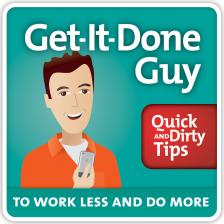How to Find a Job When You Have an Unusual Background
When you are a square peg looking for a square hole, life is good. But when you don’t fit neatly into a job search box, you might need to change the questions you ask. Get-It-Done Guy explains how.

The problem, of course, is industrialization. I just love living in an industrialized society! We’re so efficient at everything, and it’s all because of mass production. Henry Ford invented the assembly line and boom! Our products had consistently high quality because we made each one the same way. Then a marketing genius discovered that you get higher profits through “planned obsolescence,” and now we make everything at consistently low quality, because we make each one the same way.
The only fly in the ointment is people. And people aren’t even flies. Not only that, but those pesky people don’t all behave the same. They blather on about “individual differences” and wanting to “bring their whole selves” to work.
Hogwash!
Would you look at the statue of Michelangelo’s David and think, “I wish Michelangelo had brought the whole block of marble to the showroom?” Nonsense. You want the version where they’ve chipped every single teeny, tiny bit of individuality, leaving only the exact product you want.
I recently toyed with re-entering the workforce, myself. I’ve alternated between entrepreneur, self-employed executive coach, senior management curriculum designer, consultant, and speaker for many, many years. We call that “focus.” But despite looking like a manly-man version of Michelangelo’s David, I didn’t know where to start. I consulted Debra Feldman, the JobWhiz Executive Talent Agency about my quandary:
How do you approach a job search as a jack-of-many-trades in a world that’s looking for single-focused specialists?
Sponsor: Igloo. Igloo is an intranet you’ll actually like, whether you’re a large enterprise or a fast-growing business overwhelmed by apps. Sign up now and try it for free at igloosoftware.com/getitdone.
Stop Being You
My concern was wanting to be me. “I’m an executive coach, entrepreneur, speaker, curriculum designer.” Oddly, Monster.com turned up zero job listings looking for executive-coach-entrepreneur-speaker-curriculum-designers.
If you can’t find answers, try changing your questions.
Many of us define ourselves: “I’m a web designer,” “I’m the smart one,” “I’m a good communicator,” “I’m a merchandising procurement specialist.” These are all stated as “I am … something.” That’s an identity statement, a statement of self-image, of whom you believe yourself to be. As we covered in the episode about telling people they’re wrong, we take our self-images very seriously. We cling to our self-image, even when it doesn’t serve us.
Once we have a strong self-image, we interpret our skills, abilities, and work history through that lens. “I’m the smart one, so I need a job that requires smarts.” That sounds great, but it filters out the many, many jobs that are fun, pay well, but only require average intelligence, if even that. When you’re changing careers or have a checkered past—er, I mean, a broad variety of experience—then clinging too tightly to a particular identity won’t serve you.
Debra suggests instead to think of yourself in terms of capabilities and characteristics. Not, “I’m the smart one,” but “I can be a genius at doing X, Y, or Z.” In my case, not, “I’m a smart executive coach,” but “I can effectively bring out the best in a person or team, both professionally and personally.” Phrased that way, it suddenly becomes obvious that possible careers include managing people, doing high-touch sales, or becoming the Kardashian’s business manager. (Kris Jenner, if you’re listening, give me a call.)
When talking to people at cocktail parties or networking events, a capabilities-based conversation can go much more interesting places than an identity-based conversation.
Don’t Look for a You-Shaped Hole
“Fine,” I told her, “Capabilities. Got it. But can’t I just find a company with a Stever-shaped hole?”
“You’re whining,” she pointed out. I shut up. “You’re also being inefficient,” she said.
What? Me? Inefficient!?!?!
“You’re looking at companies and asking if there’s a Stever-shaped hole. Most companies only have holes that are shaped like Katy Perry or Joe the Plumber. Or Kim Kardashian”
Oh.
“You’re not likely to find Stever-shaped holes at any random company.”
She explained a better search strategy: Start by asking, “Which people need Stevers?” Then look for companies and opportunities to serve those people. If my capabilities include bringing a group together to do awesome stuff, who needs that? If I can help people identify and overcome their limiting beliefs, who needs that? If I can keep people on track, moving forward, who needs that? If I can co-write an educational musical about zombies, Oreo Ice Cream cake, and personal productivity, who needs that?
(You do. Check out WorklessAndDoMore.com to see a short promo video for the musical.)
Don’t Ask What You Want to Do

When you’re young, asking “What do I want” helps you broaden yourself, follow your interests, learn new things, and hopefully become an awesome person instead of a mindless drone whose personal development ends at age 23.
Once you have some experience, however, it’s unlikely you’ll be able to use all of it at once. Debra suggested changing the question from “What do I want to do?” to “What am I willing to let go of?” And that question is brilliant! Because even though I want to do many different things, I’m willing to let go of an awful lot, to make room for something better.
I thanked Debra for her help. Because that last question really did it. It turns out I’m willing to let go of my reputation around entrepreneurship, life coaching, and career coaching. But not my love of learning and teaching. Or my love of business and strategy. Or my desire to have a big impact on the world. Or my love of having a manly-man body that can metabolize an Oreo Ice Cream cake in one sitting.
I’m revamping my coaching practice around a single specialty. But I’m not quite ready to say what it is yet. At the end of the day, it’s an audience that can get the most value from my skills, it’s a fit for my skill set, and I’m wiling to let go of the other areas of my expertise.
It feels right and thanks to Debra, “the job whiz,” I realized this by changing my questions.

This is Stever Robbins. I advise and consult with…well, I’m not going to tell you just yet. But if you want to hear when I’m ready to announce it, just sign up for notifications at SteverRobbins.com.
Work Less, Do More, and have a Great Life!



